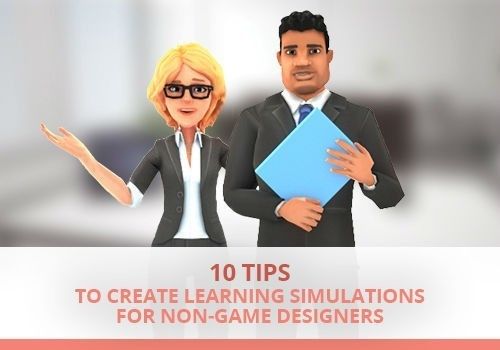Game Design Tips For Adult eLearning
eLearning Game Tip #1: Avoid The Fantastical
It's tempting, when designing a game for eLearning, to reach for the stories and gimmicks we love from recreational gaming. What better way to make a dry topic fun than to set it in space, create a mystery, sprinkle in some magic, or add in an adventure?
Here's the problem: fun is a great goal for recreation. Engagement is a better goal for eLearning aimed at adults.
Adult learners typically enter your course with intrinsic motivation—they want to learn a skill, fulfill a requirement, or make their boss happy. They want to gain the information and skills that they came for as quickly and directly as possible.
Storytelling and game elements can be great tools for making the learning memorable, illustrating practical applications, and reinforcing key concepts.
There's no need to abstract the lesson with pirates or dragons, though. It's distracting, it feels artificial, and it moves the learner away from the practical application of knowledge.
eLearning Game Tip #2: Tell Real Stories
Luckily, skills- or process-related training lends itself easily to storytelling. The stories themselves may not be intrinsically fascinating to anyone off the street – changing a tire or contributing to a business meeting won't break the box office.
In an eLearning context, however, these same stories are relevant to the learners' lives. They're the star. Combined with the intrinsic motivation of adult learning, this is more than enough to keep them hooked.
Elevating the stakes to a worst-case scenario is often effective, but the situations and consequences should be grounded in realism. Subject Matter Experts (SMEs) will prove invaluable during the research and review phases, providing common challenges and realistic details, then making sure the stories you tell ring true to the audience.
eLearning Game Tip #3: Keep Details Relevant
Realism is often found in the details, so fleshing out the story elements (or what we might call "content gamification elements" in eLearning) can help ground the narrative and make it more "real."
If you're training workers to serve a wide variety of clients, don't try to hover in the realm of the generic. Give characters their own names, commit to a type of business, and invent a specific product. Keep your choices in the realm of the typical for your audience, but characters, settings, and conflicts that are too generic are harder to relate to than specific ones.
Carefully consider what details are relevant, though. It can be easy to get lost in storybuilding, but you'll overwhelm learners if you include too much extraneous information.
Finally, think about the way details are presented. What's the most relevant way your learners can get the information?
If your course is for an audience who will sit in a cubicle while communicating by phone, it may be smarter to focus on audio elements instead of visuals. Give case details as they would get them "in the wild"—by listening to someone speak.
If your course is about chat support skills instead, then a simulated version of the chat interface makes more sense. If you're teaching about judging tone and body language in person, then a combination of visual and audio elements would be most helpful.
eLearning Game Tip #4: Align Game Mechanics With Real World Consequences
Game mechanics (or what we might call "structural gamification elements" in eLearning) add challenge and interest, but when you're authoring an eLearning game focused on performance improvement or skills development, you should align game mechanics with the real-world goals and consequences that learners are likely to encounter.
For example, adding a timer element only makes sense when speed and efficiency are priorities. Time limits would be perfectly suited for a training scenario related to fast food service, but they wouldn't make much sense for an insurance adjuster's course.
Points systems, too, should reflect real-world dynamics and consequences. In most jobs, there can be "right" and "wrong" answers, but there are often lessons to be learned from the nuances.
eLearning games can mirror this through variation in scoring. For example, you can assign zero points to a wrong or improper answer, one point to a sufficient answer, and two points to a response that goes above and beyond.
Speaking of consequences, don't expect game mechanics to do all the heavy lifting. Provide detailed feedback that explains why one answer is best, the potential consequences of the wrong answer they chose, or both.
eLearning Game Tip #5: Pick An Authoring Tool That Makes Game Design Easy
The right eLearning authoring tool can make it easy to follow these best practices with features like:
- Stock libraries that represent various industries
- Content management for custom multimedia assets
- Widgets to simplify structural gamification, score/progress visualization, timers, and more
- The ability to build dynamic, complex sets of interactions
- Variables, triggers, and actions to provide custom feedback based on the combination of the learners' choices to multiple questions' responses
- Reviewer tools to help your SMEs provide detailed, focused feedback
dominKnow | ONE provides all of this and more in a cloud-based, full-featured, and collaborative environment. Our scenario builder can be particularly helpful for authoring branching scenarios. Custom characters and settings are now supported.
Check out the examples on our website for scenarios, simulations, and other types of game-based learning that folks have created using dominKnow | ONE.
Want to learn more? Contact me or leave a comment below.









